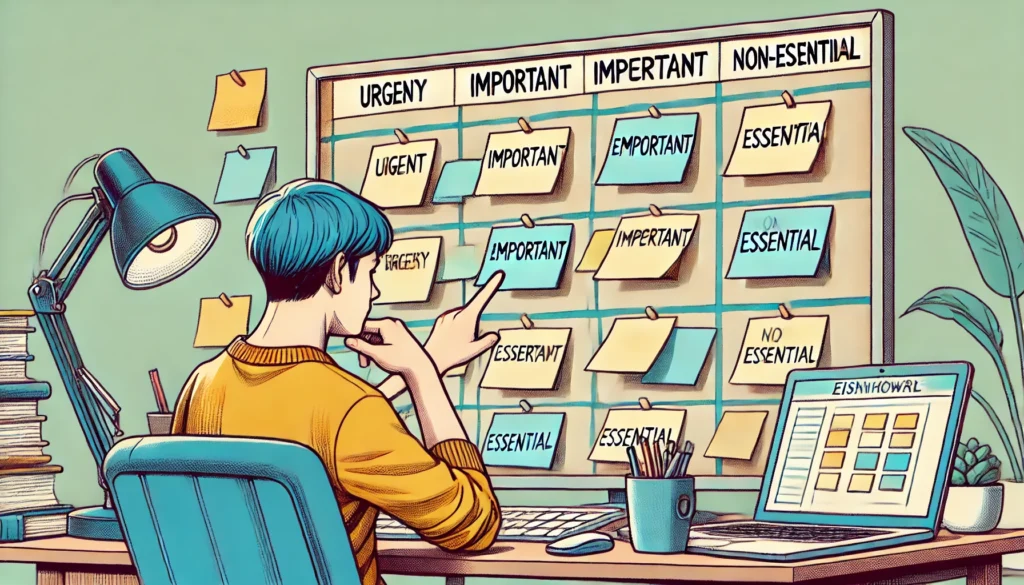Before diving into strategies, it’s important to understand what time management truly entails. At its core, time management is the process of organizing and planning how to divide your time among various activities. Effective time management enables students to work smarter, not harder, ensuring that they accomplish more in less time and with less stress.
You may also like: Tips for Boosting Your Attention Span
Defining Time Management
Time management is more than just scheduling activities. It involves a mindset that prioritizes efficiency and goal achievement. Students need to understand that time management is about making deliberate choices to allocate time to tasks that align with their objectives.
The Psychological Impact of Time Management
Good time management can reduce anxiety and increase confidence. When students feel in control of their time, they experience less stress and are more likely to approach tasks with a positive attitude. This psychological benefit can enhance their overall academic performance.
Time Management Myths
There are many misconceptions about time management, such as the belief that it requires rigid scheduling. In reality, effective time management is flexible and adaptable, allowing students to adjust to unexpected changes without feeling derailed.
The Importance of Time Management for Students
Time management is particularly crucial for students as it directly impacts their academic performance, stress levels, and overall well-being. Poor time management can lead to procrastination, last-minute cramming, and subpar results. Conversely, good time management helps students prioritize tasks, set realistic goals, and achieve a healthy work-life balance.
Academic Performance and Time Management
Time management directly correlates with academic success. Students who manage their time well are more likely to complete assignments on time, prepare adequately for exams, and engage effectively in class activities. This proactive approach can lead to better grades and deeper learning.
Stress Reduction Through Time Management
Effective time management can significantly reduce stress levels. By organizing their schedules and setting aside time for relaxation and leisure, students can prevent burnout and maintain their mental health. A balanced schedule allows for both productivity and rest.
Achieving a Healthy Work-Life Balance
Students often juggle multiple responsibilities, including academics, part-time work, and social activities. Good time management helps them balance these commitments, ensuring they have time for hobbies and relationships, which are essential for personal development and happiness.

Time Management Techniques for Students
Developing strong time management skills involves adopting various techniques that can be tailored to individual preferences and needs. Here, we’ll explore some of the most effective time management methods for students.
Setting SMART Goals
One of the foundational aspects of time management is setting goals. However, not all goals are created equal. The SMART criteria—Specific, Measurable, Achievable, Relevant, and Time-bound—provide a framework for setting effective goals. For example, instead of setting a vague goal like “study more,” a student might set a SMART goal such as “study biology for one hour every evening this week to prepare for Friday’s test.
Understanding SMART Goals
SMART goals are structured to provide clarity and direction. By ensuring that goals are specific and measurable, students can track their progress and stay motivated. This method encourages setting realistic and time-bound objectives, preventing the frustration of unattainable targets.
Applying SMART Goals to Academic Tasks
Students can use SMART goals for various academic tasks, such as completing assignments, preparing for exams, or even participating in extracurricular activities. By breaking down larger objectives into smaller, manageable tasks, students can maintain focus and motivation.
Reviewing and Adjusting SMART Goals
Setting goals is not a one-time activity. Students should regularly review their SMART goals to assess progress and make necessary adjustments. This ongoing evaluation helps them stay aligned with their priorities and adapt to any changes in their academic or personal lives.
Prioritization: The Eisenhower Box
The Eisenhower Box, also known as the Urgent-Important Matrix, is a powerful tool for prioritizing tasks. By categorizing tasks into four quadrants based on their urgency and importance, students can identify which tasks to focus on immediately, which to schedule for later, which to delegate, and which to eliminate. This technique helps students manage their workload more effectively and avoid the trap of focusing solely on urgent tasks at the expense of important ones.
Understanding the Urgent-Important Matrix
The matrix encourages students to differentiate between tasks that require immediate attention and those that contribute to long-term goals. By focusing on what’s important, students can prevent crises and reduce stress.
Implementing the Matrix in Daily Planning
Students should apply the Eisenhower Box to their daily or weekly planning. This involves listing tasks, categorizing them into the matrix, and then acting according to the priorities identified. This systematic approach ensures that important tasks are not overshadowed by urgent but less significant ones.
Benefits of Task Prioritization
Prioritizing tasks helps students allocate their time and energy more efficiently. By concentrating on high-impact activities, they can achieve better results without spreading themselves too thin. This approach also fosters a sense of accomplishment and motivation.
The Pomodoro Technique
The Pomodoro Technique is a time management method that involves working in short, focused bursts (typically 25 minutes), followed by a short break (5 minutes). After completing four “Pomodoros,” a longer break (15-30 minutes) is taken. This approach helps students maintain concentration, reduce mental fatigue, and improve productivity.
Origin and Principles of the Pomodoro Technique
Developed by Francesco Cirillo, the Pomodoro Technique is based on the idea that frequent breaks can improve mental agility. The method uses a timer to create a sense of urgency, promoting sustained focus during work sessions.
Implementing the Technique in Study Routines
Students can incorporate the Pomodoro Technique into their study routines by setting clear objectives for each session. This focused approach helps them manage time effectively and prevents burnout, making study sessions more productive and less stressful.
Adapting the Technique for Different Tasks
While the standard Pomodoro session lasts 25 minutes, students can adjust the duration based on the task at hand. More challenging or engaging tasks might require longer focus periods, while simpler tasks can be completed in shorter bursts.

Time Management Strategies for Students
Beyond specific techniques, there are broader strategies that students can adopt to enhance their time management skills.
Creating a Structured Schedule
A well-structured schedule is the backbone of effective time management. Students should allocate specific time blocks for studying, attending classes, participating in extracurricular activities, and relaxing. Using digital tools like calendars and scheduling apps can help students visualize their commitments and make adjustments as needed.
The Role of Scheduling in Time Management
Scheduling helps students organize their time by setting boundaries and establishing routines. A structured schedule reduces the likelihood of overcommitting and helps students allocate time for both work and leisure.
Tools and Apps for Creating Schedules
Numerous digital tools and apps are available to assist students in creating and managing their schedules. These tools offer features like reminders, color-coded events, and integration with other digital platforms, making it easier to stay on track.
Balancing Flexibility and Structure
While a structured schedule is important, students should also allow room for flexibility. Life is unpredictable, and being able to adapt to changes without feeling overwhelmed is a key aspect of effective time management.
Breaking Tasks into Smaller Steps
Large projects and assignments can be daunting, leading to procrastination. By breaking tasks into smaller, manageable steps, students can make progress incrementally and avoid feeling overwhelmed. This approach also allows for more accurate time estimation and planning.
The Psychology Behind Task Segmentation
Breaking tasks into smaller steps reduces the psychological barrier of starting large projects. This segmentation makes tasks appear less daunting, encouraging students to take the first step toward completion.
Practical Steps for Task Breakdown
Students can break down tasks by identifying the major components and dividing them into manageable parts. Creating a timeline for each step ensures steady progress and prevents last-minute rushes.
Overcoming Procrastination with Task Breakdown
Task segmentation is a powerful tool against procrastination. By focusing on small, achievable goals, students can build momentum and maintain motivation throughout the project.
Eliminating Distractions
In today’s digital age, distractions are abundant. Students should identify their primary sources of distraction—such as social media, notifications, or a noisy environment—and take steps to minimize them. This might involve setting specific times for checking messages, using apps to block distracting websites, or creating a dedicated study space.
Identifying Common Distractions
Students should start by identifying their most common distractions, which can vary from digital interruptions to environmental factors. Understanding these distractions is the first step toward managing them effectively.
Strategies for Minimizing Digital Distractions
There are various strategies to minimize digital distractions, including using website blockers, setting specific times for social media use, and turning off non-essential notifications. These tactics help students stay focused during study sessions.
Creating an Optimal Study Environment
An optimal study environment is free from unnecessary distractions and conducive to concentration. Students should find a quiet space, organize their study materials, and ensure adequate lighting to create a productive atmosphere.

Time Management Tips for Students
While techniques and strategies provide a framework, practical tips can further enhance a student’s time management skills.
Staying Organized
Keeping a tidy workspace and having organized notes and materials can save time and reduce stress. Students should develop a system for organizing their study materials, whether it’s using binders, digital folders, or note-taking apps.
The Benefits of an Organized Workspace
An organized workspace helps students focus better and find materials quickly, reducing the time spent searching for lost items. This organization contributes to a more efficient study routine.
Systems for Organizing Study Materials
Students can choose from various organizational systems, such as color-coding, digital folders, or physical binders. Selecting a system that aligns with their preferences and sticking to it ensures consistency and order.
Maintaining Organization Over Time
Organization is an ongoing process. Students should regularly review and update their organizational systems to ensure they remain effective and adapt to changing needs.
Practicing Self-Discipline
Time management ultimately requires self-discipline. Students should hold themselves accountable to their schedules and goals, rewarding themselves for achievements and re-evaluating their approach when they fall short.
The Role of Self-Discipline in Time Management
Self-discipline is the backbone of successful time management. It involves making conscious decisions to adhere to schedules and resist distractions, even when motivation wanes.
Techniques for Building Self-Discipline
Students can build self-discipline by setting clear boundaries, creating accountability systems, and using positive reinforcement. These techniques help maintain focus and commitment to their time management plans.
Overcoming Challenges to Self-Discipline
Students may face challenges such as fatigue or temptation to procrastinate. Developing strategies to overcome these obstacles, such as taking short breaks or seeking support, can strengthen self-discipline.
Seeking Support
If time management challenges persist, students shouldn’t hesitate to seek support. This might involve consulting teachers, counselors, or peers for advice, or even enrolling in workshops focused on time management skills.
Recognizing When to Seek Help
Students should be aware of signs that indicate they need support, such as persistent stress or falling behind in coursework. Recognizing these signs early can prevent more serious issues.
Sources of Support for Time Management
There are various sources of support available, including teachers, academic advisors, counselors, and peers. Seeking advice from these individuals can provide new perspectives and strategies for improvement.
The Benefits of Time Management Workshops
Workshops focused on time management offer structured learning opportunities. They provide students with practical tools and techniques to enhance their skills and improve their overall academic performance.
The Future of Time Management in Education
As educational paradigms continue to evolve, so too will the approaches to time management. Future trends may include the integration of artificial intelligence to personalize time management tools and provide real-time feedback to students. Additionally, educational institutions may place greater emphasis on teaching time management skills as part of the core curriculum, recognizing their critical role in student success.
The Role of Technology in Time Management
Technology will play an increasingly significant role in time management, offering personalized solutions and real-time analytics. These advancements can help students optimize their schedules and make informed decisions.
The Integration of Time Management in Education
As educators recognize the importance of time management, it’s likely that these skills will become a more integral part of the curriculum. Teaching students how to manage their time effectively is essential for their academic and personal success.
Preparing Students for a Time-Managed Future
By equipping students with time management skills, educational institutions prepare them for the demands of the modern world. These skills are not only valuable academically but are also crucial for career and personal development.
Conclusion
Time management is an essential skill that can significantly impact a student’s academic journey and overall well-being. By understanding the principles of time management and adopting effective techniques and strategies, students can navigate their responsibilities with greater ease and confidence. As they develop these skills, students not only enhance their academic performance but also lay the foundation for success in their future careers and personal lives.
Incorporating these time management skills into daily routines empowers students to take control of their time, reduce stress, and achieve a fulfilling balance between their academic and personal pursuits. By mastering time management, students can unlock their full potential and thrive in all areas of life.
Further Reading:
8 Time Management Tips for Students
12 Tips for Better Time Management for College Students
Time Management and Productivity
Important Note: The information contained in this article is for general informational purposes only, and should not be construed as health or medical advice, nor is it intended to diagnose, prevent, treat, or cure any disease or health condition. Before embarking on any diet, fitness regimen, or program of nutritional supplementation, it is advisable to consult your healthcare professional in order to determine its safety and probable efficacy in terms of your individual state of health.
Regarding Nutritional Supplements Or Other Non-Prescription Health Products: If any nutritional supplements or other non-prescription health products are mentioned in the foregoing article, any claims or statements made about them have not been evaluated by the U.S. Food and Drug Administration, and such nutritional supplements or other health products are not intended to diagnose, treat, cure, or prevent any disease.


